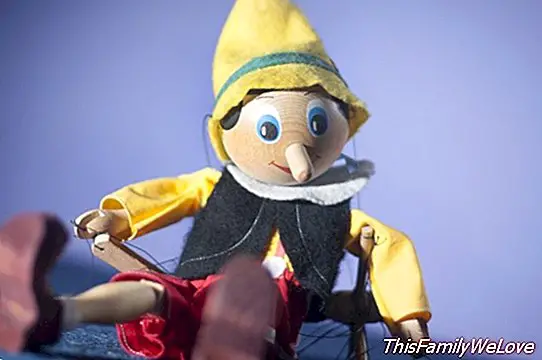The lies of children by ages

Most parents want to think well of their children, and sometimes it is difficult to know what to do when we catch our son lying. Children and adolescents lie for many different reasons, depending on the stage they are in.
To the parents, to know how they have to respond to a lie, it can be useful to know how the type of lie and the underlying motive is changing according to the stage of development in which the child or adolescent is. And is that the lies of children are different by age, ie, they vary according to their period of development. So parents can know what they should do when they catch their children in a lie.
How is the concept of lying changing throughout development
As the child's brain develops, it acquires different abilities to think and reason. The ability of a child to understand the consequences of a lie or to manipulate and control the situation through lying is linked to the stage of development in which his brain is located.
Of course, having the ability to fabricate lies and lie are two very different things. However, it is important that parents are aware of what a child's mind is capable of doing before deciding, if they discover that their child has lied, what consequences that lie should have. Also, this information also helps parents know how much they have to ask by asking questions if they suspect that their child is telling lies or being untruthful.
The different phases of child development and cognitive functioning
- Babies and small children (0-3 years). It is very rare that the child lies, if only because he is still learning to communicate. If you lack the truth, it is normal that it is because you have not understood the meaning of a word or the way we have used the language.
- Young children (3-5 years). At this age children still do not have the ability to lie for the purpose of cheating. Instead, in this phase children are developing magical thinking, which is one of the ways they have to interpret what they are living based on how they perceive the world around them or how they would like it to be.
- Children (5-9 years). Some children already begin to lie at these ages. The brain of these children has not yet developed abstract thinking and, for this reason, children reason using the information they capture through the senses. When a primary school child misses the truth, it is normal for him to alter the facts related to a given episode or to include a wish as part of the lie.
- Preadolescents (9-12 years). Preteens have the ability to fabricate lies, thanks to their brain beginning to develop the skills necessary for abstract reasoning. They elaborate their reasoning by mixing information that they have captured through the senses with a certain capacity to predict the results. When they lack the truth, these preadolescents usually focus on modifying or inventing facts to achieve a certain result or to achieve something they want.
- Adolescents - early stage (13-15 years). Most of these adolescents have already developed abstract thinking, and their brain is able to manipulate various hypothetical situations and predict how each will evolve. In addition, they are capable of elaborating complex falsehoods that are based on facts, but that later embellish or alter until they create the message they wish to convey.
- Adolescents - late stage (16-19 + years). These adolescents already master abstract thinking. Your brain is perfectly capable of evaluating information, drawing conclusions and predicting future events reliably. This capacity allows them to estimate irrigation. These adolescents have the ability to fabricate complex lies that are later credible and with which they can deceive or hide objective realities.
Deanna Marie Mason, expert in education and family health. Author of the blog Dr. Deanna Marie Mason. An educational approach to adaptation
It may interest you:
- 10 tips against the lies of children
- Childhood lies: what to do if you catch them in a lie?
- The lie, why do children lie?
- Sincerity, educating in values
- Teens, face the truth or resort to lying




